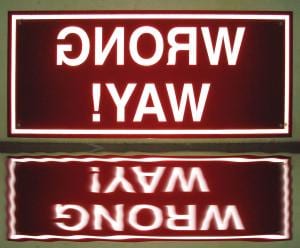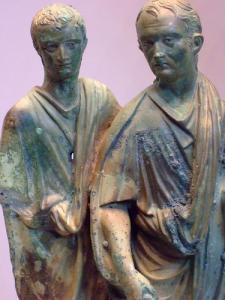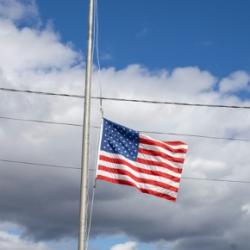Many Christians (including my previous self) are so busy assuming our theology is “right” that we don’t bother with the kind of self-examination that might inform us otherwise.
Since I walked away from the evangelical scene a few years back, I’ve tried to start conversations with folks who are still there. They literally refuse to engage: “You’re not going to change my mind, so let’s not even go there.”
This is the case all over Christendom: we believe we already have all the answers, so we don’t want to waste time talking with people who think differently.
I believed for years that I was reading the Bible literally and accurately. I believed I had the “mind of Christ,” and that anyone who disagreed with me was at best influenced by worldliness, at worst in cahoots with the Evil One. In reality, I was just being a very loyal follower of those who had influenced me.
 I realized how wrong I’d been and did what I had to do: flipped from conservative to progressive. I consider this one of the greatest blessings of my life, as well as one of the greatest traumas. It’s no small thing to walk away after half a century inside a belief system.
I realized how wrong I’d been and did what I had to do: flipped from conservative to progressive. I consider this one of the greatest blessings of my life, as well as one of the greatest traumas. It’s no small thing to walk away after half a century inside a belief system.
So, where did our religious beliefs originate, that we are so confident in them?
Many sources
We are all disciples, not just of Jesus, but also of our teachers, parents, pastors, and other people of influence – and they are all (except Jesus) human and imperfect. We are also shaped by our culture and life experiences in a decidedly imperfect world. With all of these factors working against us, the odds of having flawless theology are not in our favor.
But we forget the human origins of our theology and act like our beliefs came directly from on high. (Extreme example: someone actually commented to me on Facebook, “God put Trump in office. The Bible says so.”)
Based on our chosen theology, we refuse to acknowledge what the Bible says about the oppressed and the immigrant. We ignore what Jesus said about loving our neighbors. We pretend that he is not the Prince of Peace.
We’ve made Jesus into our image: a Republican.
We willfully shut truths out of our minds for the sake of our conservative agenda. Of course, we don’t see it that way – we just see ourselves being faithful to God. And in our “godliness” we refuse to entertain any other point of view than “God’s.”
Selective use of Scripture
It takes a special kind of denial to know Jesus and still approve of children in cages, people of color being killed by law enforcement, and thousands of Americans dying every week from Covid.
We use the Bible, of course, to “sanctify” our paradigm. Cherry-picked Bible verses control our rhetoric – and cause us to cling for dear life to positions that are clearly against Jesus’ teachings. We withhold compassion, grace, and gentleness and call ourselves followers of Christ.
But when did Jesus do anything even remotely like taking children away from their parents? When did he refuse food to anyone who was hungry? When did he shrug off oppression or prejudice? In what scenario would he congratulate a crowd for being reckless? (Yes, I’m talking about masks. If you want to be kind to your neighbor – even if you don’t believe the pandemic exists – you are being reckless when you refuse to mask up.)
Why do we act this way? Why do we stick with beliefs that contradict Jesus, even as we say he is our Lord?
Jesus spent a great part of his ministry years correcting people who thought they knew what God wanted – and most of them didn’t listen because they were too stubborn.
We love knowing that we’re right – but maybe we’ve elevated “rightness” to too high a position.

History of theology
In the early centuries after Christ’s life on earth, we Christians began to write creeds to define our beliefs precisely, and to set ourselves apart from “heretics.” Not surprisingly, we were never the heretics.
In the early 300s AD, controversy arose over the person of Christ. The emperor Constantine called church leaders together from all over the empire to debate and reach consensus. Over 300 bishops came to the First Council of Nicaea (325 AD), to debate the nature of Jesus and his relationship to God.
One school of thought regarded Jesus as divine and co-eternal with God the Father, while the other considered him to be the first among created beings and inferior to God the Father. Both sides had Scripture to back them up. (Look up Arianism – the arguments are not shabby!)
Bottom line: Jesus was determined to be divine by majority rule. And so, officially, the Godhead included the Father and the Son.
The First Council of Constantinople in 381 tackled the issue of the Holy Spirit, ultimately deciding (by vote) that s/he/it was also part of the Godhead. Think about that for a moment: before 381, the concept of the Trinity didn’t exist. It hadn’t been invented.
Today, mainline Christians wouldn’t think of questioning the Trinity and the divinity of Jesus – but those doctrines were not given to us on Mount Sinai. They were given to us by guys in togas (at least, that’s how I picture them).
Nicaea and Constantinople were just two of the many, many councils that met over the centuries. Often, one council would overturn the decision of a previous council. Frequently, a bishop who had been a hero at one council would be exiled as a heretic in the next. Civic (or even religious) leaders who favored one school of thought used bribery to get the vote to swing their way.
Why am I giving this dry history of ecumenical councils? To remind us that theology is manmade. What most mainline Christians believe as a given is not in the literal sense Biblical. Rather, people who studied the Bible created those theories (and others created opposing theories).
We should take the hint: hold our theology loosely and humbly, and recall that it is manmade. Be teachable.
How then shall we live?
How about this idea: we acknowledge that when it comes to the things of God, nobody knows for sure. How about this corollary: it’s okay to not know for sure.
What’s not okay is to live a life contrary to the clearest teachings of Jesus – to care for the needy, the stranger, the sick; to love our neighbors as ourselves; to forgive extravagantly.
Let these be the mountains we’re willing to die on, let these be the thoughts that capture our hearts.
No more thinking, “I read the Bible literally, but y’all are interpreting it to suit you,” or “I want to understand the Bible accurately, but y’all have an agenda.” We all interpret, we all have an agenda.
Let’s share the same agenda: “Working together to bring justice and peace to the world, being Jesus’ hands and feet.”
FEATURED IMAGE: “Wrong Way … Way Wrong” by Bob.Fornal is licensed under CC BY-NC-SA 2.0













